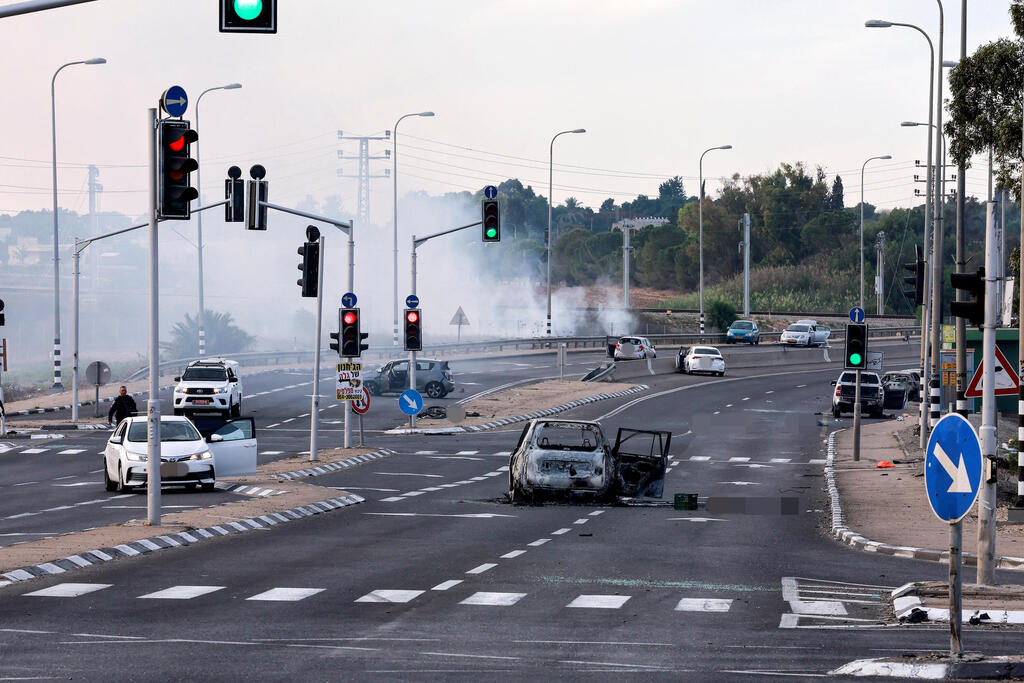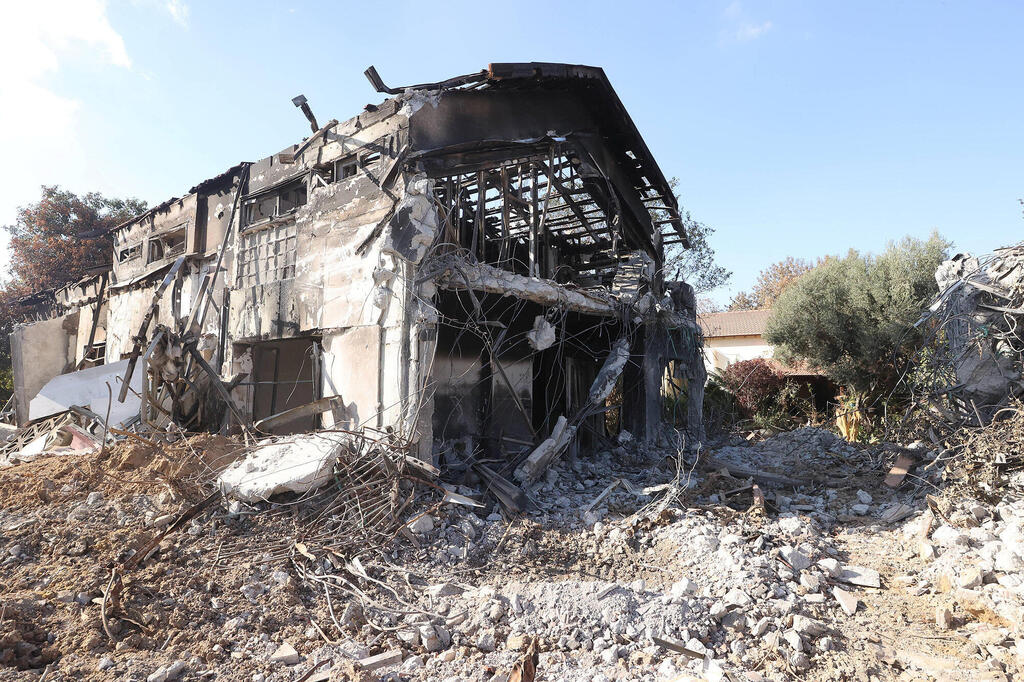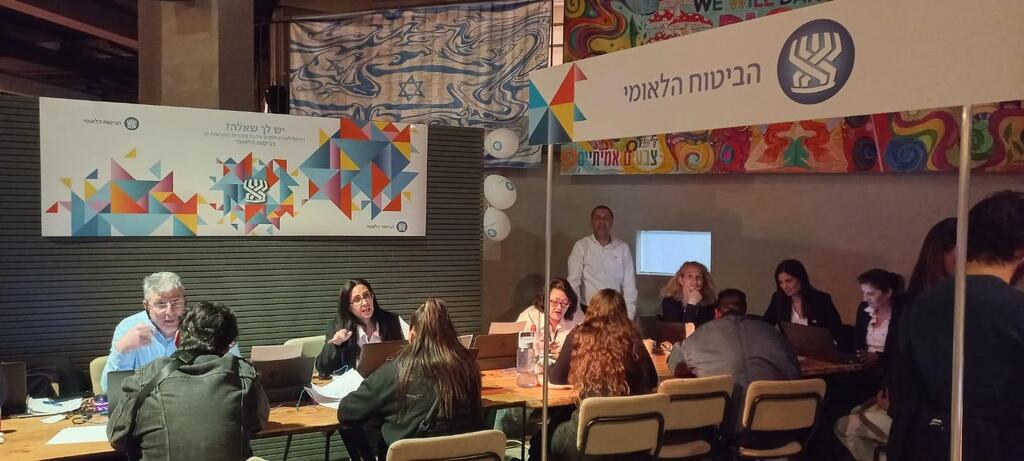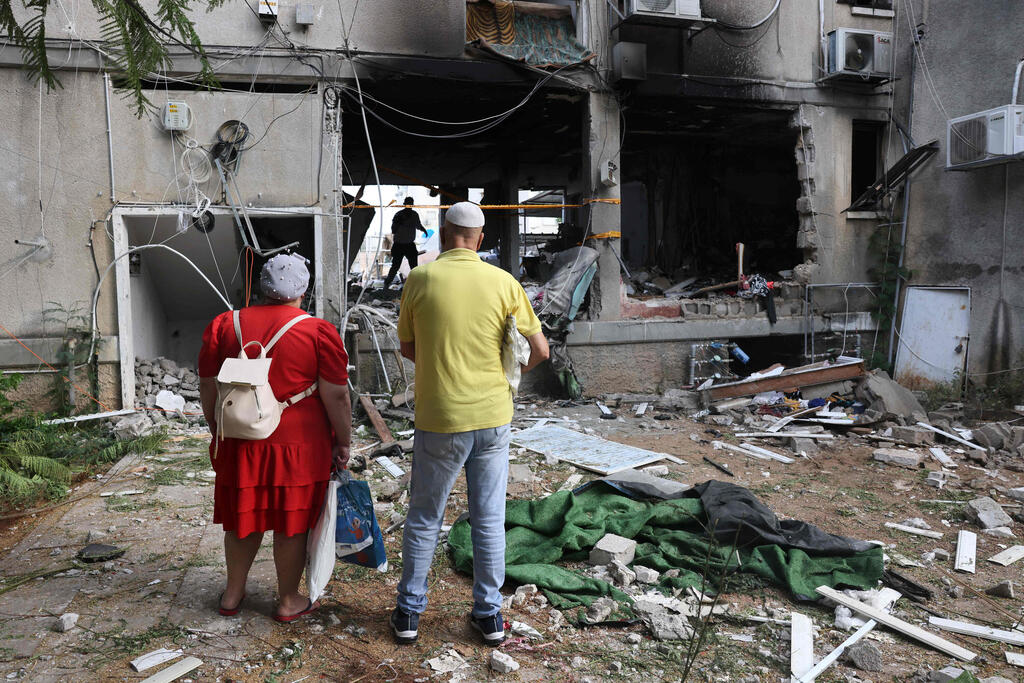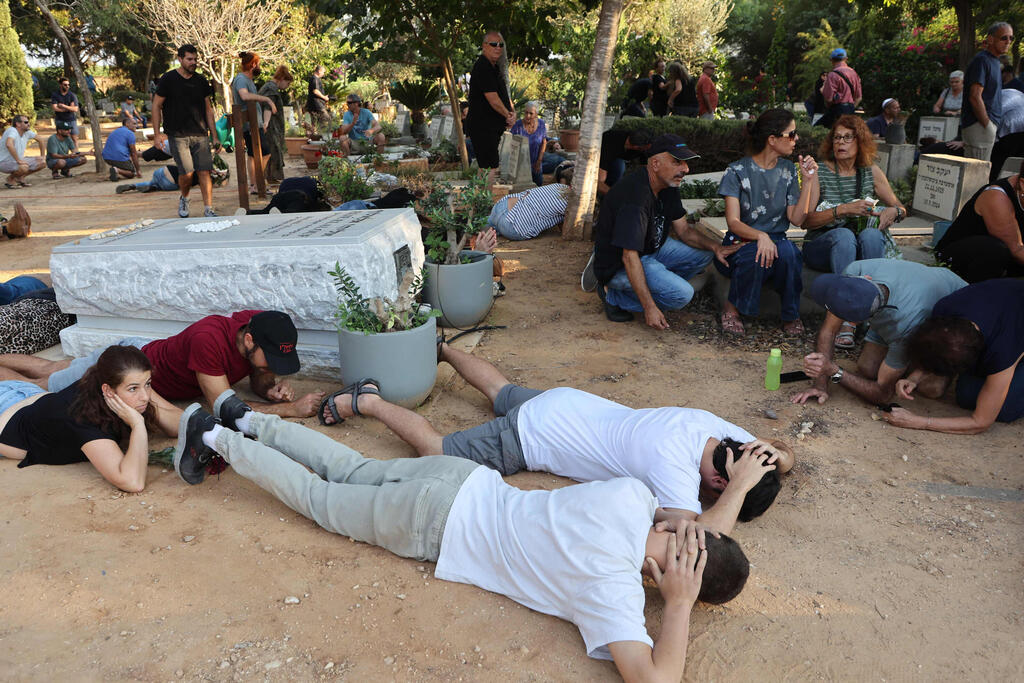Getting your Trinity Audio player ready...
The ongoing war has led to an unprecedented number of casualties in Israel, impacting tens of thousands of people with a wide range of injuries. In a recent meeting of the Knesset State Control Committee, significant gaps in the treatment of survivors and their families were brought to light. Survivors of the massacre and their families voiced their frustration and dissatisfaction with the current situation.
Roni Katz, a mother of two who survived the massacre and whose son suffered a psychotic breakdown in Thailand, spoke out about the lack of recognition for the suffering of survivors. "There are so many parents like me who left their jobs, who are guarding their children so that they don't die. I am trembling with fear, I don't sleep at night, I put a baby monitor under his bed. I am afraid to leave the house," Katz said.
National Insurance Institute Deputy Legal Advisor Shlomi Mor explained that the rights of war victims are identical to those of IDF soldiers and bereaved families. "In this case, the entitlements under the law are the same, but the National Insurance Institute handles them," he said.
"We have worked to make the information accessible through digital and physical rights brochures, a dedicated website where you can review your entitlements, including specific rights calculators, and an emergency hotline providing immediate assistance and support for the rights of Israeli residents - 02-6269999. We have done a lot of work to reach the population, and we see the results in both the data and the payments."
Victims of terrorist actions
"October 7 was not just another event for the National Insurance Institute. It was a 'game changer,' not only in terms of the number of casualties but also in terms of the complexity of the injuries and issues that the National Insurance Institute had to address for the first time," explains Mor.
"Before October 7, we were dealing with about 9,000 victims of terrorist actions, and since October 7, we are talking about an additional 65,000 victims of terrorist actions – most of them suffering from psychological trauma, but this is an injury that can significantly affect a person's functioning for many years."
According to Mor, every victim of terrorist actions who has been assigned a degree of disability is entitled to a comprehensive package of treatments for their injuries. "We are doing everything possible to simplify the process for the victims," he notes. "In the past, this entire process was divided into stages, but now the bureaucracy has been streamlined."
The National Insurance Institute explains that it relies on existing medical information to tailor the best possible treatment for tens of thousands of victims. "For example, we know there is a fear of physically attending a medical committee, so we allow victims to choose the method that suits them best," says Mor.
"If someone wants to attend physically for an in-person evaluation, that is possible. If attending the committee is stressful, there is an option to hold the committee based on medical documents or to conduct it digitally via video chat from a place where they feel safe."
"The medical committee is a critical step for continued assistance, as it not only determines the eligibility for a benefit but also ensures ongoing support and guidance throughout life. This allows us to begin treatment tailored to each individual's injury, as every person is unique, and every injury is an event: there can be psychological injury, physical injury, severe physical or psychological injury, and a combination of both. Anything can happen.
"When a person is recognized as a victim of terrorist actions, their eligibility for medical treatment compensation is assessed in the first stage. This compensation is based on the fact that they need medical treatment, recovery and are unable to work. This means that in the initial months, even before their degree of disability is determined, they are entitled to a benefit that provides continuous monthly support.
"A victim who did not work before the terrorist attack will receive an amount not less than NIS 7,000 ($1,920), and if they worked – the payment will be the average of their last three salaries. This part is individual for each victim of terrorist actions and can continue for a certain period as long as the victim is still in the medical treatment phase and unable to return to work and earn a living.
"All relevant treatments for the person and their injury, without exception. This includes initial hospitalization, surgeries or ongoing treatments through health funds, and psychological treatment," says Mor.
In the second stage, the victim will attend a medical committee where their degree of disability will be determined. "This is a medical committee required by law, similar to the Defense Ministry, but we are aware of the sensitivities and do everything to ease the process required by reality," adds Mor.
"The committee's role is to determine the degree of disability, whether physical or psychological, according to the law. A disability rate of 10%-19% entitles a one-time grant ranging from NIS 59,000-225,000 ($16,100 to $61,700), and those with a disability rate of 20% or more will be eligible for a continuous pension: victims recognized with 20% disability will receive a pension of about NIS 1,100 ($300) per month, and those recognized with 100% disability will receive about NIS 5,500 ($1,500) per month. In addition, the disability determination comes with benefits, financial assistance and eligibility for professional rehabilitation, depending on the type and severity of the injuries.
"Anyone unable to return to their workplace is entitled to professional rehabilitation, which can include funding for studies or various professional training. In some cases, we fund university tuition," Mor continues.
"Beyond that, there are entitlements in various other aspects: for example, someone with a 50% disability or more is entitled to assistance in purchasing a car. There is housing assistance and family support in cases where a family member cannot provide help, and more. I recommend visiting the National Insurance Institute website and our digital rights brochures where we update the entitlements and eligibility conditions so that all the information is accessible in the clearest way for those affected."
Regarding psychological treatment, Mor says that the nature of the victim population required them to make adjustments in this area as well. "It is important to understand that this is a new type of people, many young individuals who are sometimes less inclined to sit in front of a psychiatrist. Alternative treatments like therapy through agriculture or art speak to them more – tools that allow them to treat trauma differently. For this reason, we have expanded the treatments beyond regular psychiatric treatments," he says.
Accordingly, Mor notes that family members of psychological victims are also entitled to treatment. "If someone is recognized as a psychological victim, the understanding is that it also affects their family members, so children, spouses and partners are also entitled to psychiatric treatment from the National Insurance Institute."
Bereaved families
Another group entitled to benefits from the National Insurance Institute is bereaved families, which has grown significantly since the war began. "To put things into perspective, within a few days, we are dealing with an additional 693 bereaved parents, 177 widows, 631 orphans and 1,355 bereaved siblings," explains Mor. "This entire population—parents, widows, orphans, siblings—is entitled to support, and sadly, more and more families are being added."
This situation is extremely complex. "Usually, when we encounter victims of terrorist actions and war injuries in the civilian world, we see stories of entire families with complex human situations we've never seen before. For example, a person who is both a bereaved sibling and a victim of terrorist actions because he went to search for his brother and became a trauma victim himself. Or in cases where, unfortunately, several family members perished—the grandmother, the uncle, the brother. There are family-medical complexities here that we have not encountered before. I don't think the world has known anything like this."
"As soon as we received notification from the security forces that a family member had fallen, we automatically processed the family's rights using our databases. We provided the widows with all their entitlements: they did not need to file a claim, and, of course, they are still accompanied by our social workers for any matter or question," Mor explains.
"The war brought to light new complexities that made us realize we must address them. The IDF law, upon which we base our actions, did not know how to handle this complexity," Mor continues.
"The National Insurance Institute, whether through its interpretation or commissions it established on the matter, made efforts wherever possible to provide unique responses even in abnormal situations. For example, in a case where a mother was killed, and her sister is taking care of her minor or adult children and took them under her wing. She is not entitled to anything under the existing law, but she is caring for them."
Another population Mor mentions is orphans. "This is a group that, until now, the law provided only limited support. Generally, they received allowances until the age of 22 and did not receive dedicated assistance. We know there is an effort to promote a proposal to expand their entitlements both personally and financially at older ages, and the National Insurance Institute supports promoting legislative changes for them. I have no doubt that if we fast-forward six months, we'll see that October 7 brought a dramatic change in what they receive compared to the situation before the war. These are definitely populations that are now the focus.
Additionally, there are those whom the law has not yet addressed. "A topic that has been discussed a lot is people from the second and third circles who were digitally present," Mor explains.
"People who were on the phone with their loved ones for several hours until they heard they were murdered. I have no doubt they were mentally affected, but the law and the Defense Ministry cannot recognize them today in this context. There is a lack of response, and it is necessary to see how to provide answers to these wider circles. The Finance Ministry has established a committee to examine all these exceptional situations, and its conclusions are expected to be submitted soon."
According to Mor, bereaved families (widows/widowers, common-law partners, bereaved parents, orphans and fiancés) are entitled to a package of benefits. "Firstly, there is eligibility for a regular monthly allowance. For example, bereaved parents are entitled to an allowance of about NIS 8,200 ($2,200). If the parents are separated, each will receive about NIS 6,600 ($1,760).
"A widow/widower/common-law partner is entitled to a regular allowance based on the number of orphans in their care (up to age 22). For instance, a widow with one orphan is entitled to a regular allowance of about NIS 12,300 ($3,300). A widow with seven or more children will receive a monthly allowance of about NIS 22,500 ($6,050). Orphans not in the care of the parent are entitled to a separate allowance (independent orphan) of about NIS 5,500 ($1,485). Those who were engaged but not yet married are entitled to allowances as a widow without children for five years from the date of death—about NIS 9,900 ($2,675)."
What else are bereaved families entitled to?
In addition, bereaved families are granted various benefits and grants. Participation in mourning expenses amounts to about NIS 8,000 ($2,200). Initial assistance following widowhood amounts to about NIS 5,700 ($1,570). Coverage of the cost of bringing bereaved family members from abroad, transportation to memorial services at the cemetery, participation in burial expenses amounting to about NIS 12,500 ($3,450), and assistance in purchasing a burial plot.
Additionally, memorial grants, participation in memorial service expenses, maintenance of the burial site, an annual recuperation grant of about NIS 3,700 ($1,020) (for widows/widowers/bereaved parents), and assistance in purchasing a vehicle, driving lessons or a mobility scooter if there is a health-related mobility issue.
"There is also assistance for orphans, bereaved parents, and widowed spouses in grants for purchasing or replacing a home, renovations, loans or rental assistance," adds Mor. "If the bereaved parents, orphans or spouses are in a chronic health condition, the National Insurance Institute may provide responses and assistance, including medical advice, medications, recovery after hospitalization, and even support in cases of fertility treatments or surrogacy."
"For bereaved siblings, depending on the age specified by law, there is the possibility of funding for tutoring, a tuition grant, or participation in university tuition or vocational studies. Orphans can receive support for studies, extracurricular activities, funding for learning disability assessments, vocational training, education, and also Bar/Bat Mitzvah, wedding, and birth grants."
Hamas hostages and their families
"This is uncharted territory," notes Mor. "This population was something the Israeli law had not dealt with until now. There was no such thing. In this case, there was a fundamental and critical legislative change in these months, and there was significant support for the families of the hostages from the National Insurance Institute:
"Even before all the legislative changes that were added, we provided them (through an agreement with the State Treasury) with the rights granted to bereaved families—in other words, they received both the regular allowances and a quarterly family grant of about NIS 90,000 ($24,230). These, in addition to regular allowances based on the family composition, can reach up to about NIS 200,000 ($53,850), intended to help them with all the expenses involved in the return of the hostage."
Mor explains that families are entitled to this support until the return of the hostage. "If we know that your loved one has died but is still being held captive, your situation still does not allow you to return to normalcy. The law provides for this situation, and the support continues until the hostage is returned to Israel.
"This is a new situation of 'ambiguous bereavement' that does not end after the seven days of mourning or even after seven months. The families of the hostages are in a difficult mental state that does not allow them to return to normalcy. This is a functional, mental and medical injury, and we, of course, accompany them and continue to take care of them."
What Is a returned hostage entitled to?
"There are two laws dealing with hostages—the Victims of Terrorist Actions Law and the Law for Released Prisoners of War and Hostages. Returned hostages are entitled to rights under both laws," explains Mor.
"First, returned hostages are entitled to rights equal to those determined to have 50% disability, without having to go to a medical committee. These 50% disability entitlements include a monthly allowance of about NIS 2,750 ($750) and a package of benefits for those determined to have 50% mental disability. Additionally, under the Law for Released Prisoners of War and Hostages, returned hostages are entitled to an additional unique allowance of about NIS 3,300 ($900). This means they receive a regular allowance of about NIS 6,000 ($1,650) without going to committees."
"Additionally, returned hostages receive a one-time grant of about NIS 50,000 ($13,500) to help them acclimate and recover, and in the first three years from their return, they are entitled to a comprehensive medical treatment package that covers not only the injuries caused by the abduction but also any condition they had before being abducted unrelated to the abduction. This is based on the understanding that the trauma experienced by the hostage affects them in all aspects, and there is a risk of various deterioration," he adds.
"Therefore, they are entitled to comprehensive and holistic treatment for three years. It should be remembered that the determination of 50% disability immediately grants them all the rights mentioned so far for victims of terrorist actions, including funding and participation in medical treatments, alternative treatments, studies, vocational training, rehabilitation, vehicle assistance, housing and more."
From resilience centers to support groups for bereaved mothers
"Resilience Centers" is a term that has been frequently mentioned since the start of the war in the context of treating mental injuries. Given the significant increase in demand for mental health treatment among Israeli citizens due to the ongoing war, Mor emphasizes the importance of reaching out to these centers when needed.
"We understood even before the war that the earlier you start mental health treatment for a victim, the more you reduce the long-term mental damage," he says. "Resilience Centers are places where you receive mental health treatment even before you are officially recognized as a victim of terrorist actions, and before you approach the National Insurance Institute, simply because you were part of a terror event, like a missile falling nearby or a siren, or, God forbid, more severe events.
"It’s important to remember that these centers have dedicated trauma specialists, so the initial step is to utilize their services. Before October 7, eligibility was for 6-12 mental health treatments without contacting the National Insurance Institute. Following the events of October 7, we expanded eligibility to up to 36 treatments that you can receive there without approaching the National Insurance Institute. The victims of terrorist actions do not need to arrange the payment, and the National Insurance Institute directly funds the services so that the victim can focus solely on their treatment and recovery."
A broad response is also given in the field of rehabilitation. "The National Insurance Institute's rehabilitation is primarily occupational, including funding for degrees or professional certificates, but we also understand that the event here is different," adds Mor. "We find ourselves launching projects across the country, such as groups of bereaved mothers who meet once a month at a therapeutic farm. We saw this was very successful, and we are starting to expand this. There is another group of parents from the very religious community who meet once a week as part of a study framework, but during the shared activity, they also deal with bereavement.
"There are various groups across the country, and we adapt to the population and the need. The employees of the National Insurance Institute are not 'outsourced'; they are an integral part of the organization and the community. They meet people every day, which is incredibly important for tailoring needs to different populations and addressing the challenges and complexities that arise from the field. We constantly strive to provide them with creative and reality-adapted responses as much as possible."




